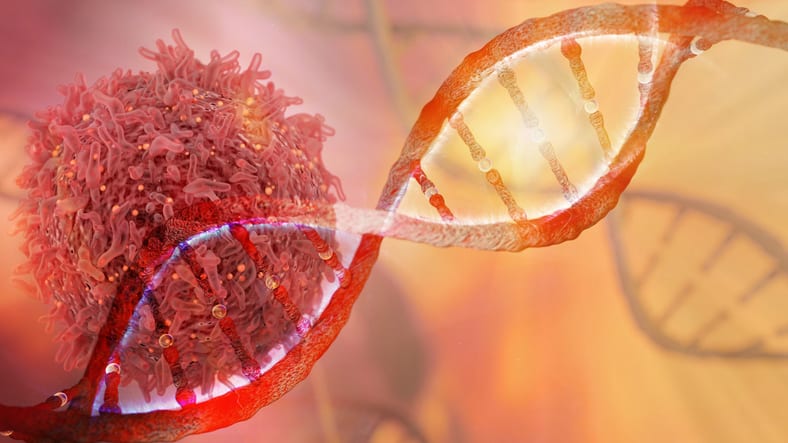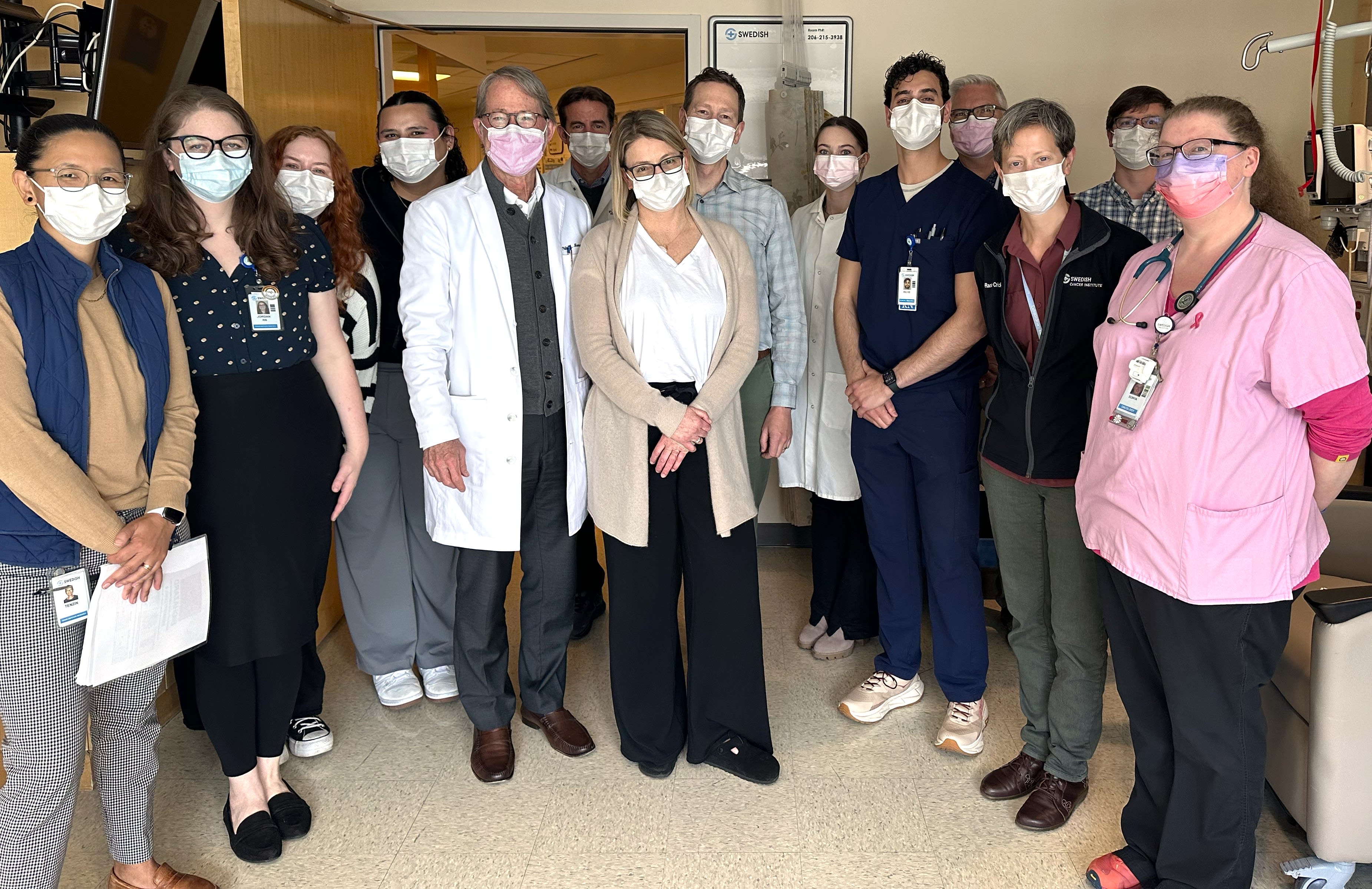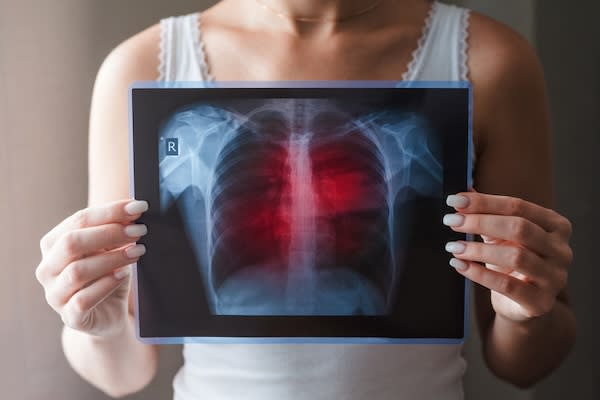Hematology Program
At the Providence Swedish Cancer Institute, our hematology experts specialize in both blood cancers and benign blood disorders, offering groundbreaking treatment options such as CAR T-cell therapy and stem cell transplantation. Our dedicated team of hematologists and oncologists provides highly personalized care to support the best possible outcomes.

Advanced Blood Disorder Care
At the Providence Swedish Cancer Institute, we offer some of the most advanced cellular therapy options in the Pacific Northwest. We are one of only two programs in Washington State offering CAR T-cell therapy — a groundbreaking treatment that reprograms a patient’s own immune cells to target cancer. Our specialists also perform autologous stem cell transplants to treat certain blood cancers and benign disorders, and bispecific antibody therapy, a newer immunotherapy that helps the immune system target blood cancers more effectively.
Whether treating benign blood disorders such as anemia and clotting conditions or pioneering leading-edge therapies for aggressive hematologic cancers, our team combines scientific innovation with compassionate, patient-centered care. With comprehensive rehabilitation, integrative therapies, and long-term wellness support, you’ll find expert, personalized care every step of the way.
Blood Disorders We Treat
We provide comprehensive care for blood disorders and related conditions, including blood cancers like leukemia and lymphoma. This includes:
- Acute Lymphoblastic Leukemia (ALL)
- Acute Myeloid Leukemia (AML)
- Amyloidosis
- Bleeding and Clotting Disorders
- Chronic Lymphocytic Leukemia (CLL)
- Chronic Myeloid Leukemia (CML)
- Lymphoma
- Multiple Myeloma
- Myelodysplastic Syndrome
- Sickle Cell Disease
- Waldenstrom Macroglobulinemia

Meet Our Hematology Team
At the Providence Swedish Cancer Institute, you’ll be cared for by a tightly connected group of experts who work collaboratively to develop a personalized approach to treatment, prevention, and long-term wellness.
Testing & Diagnostics
Our blood disorder specialists use advanced testing and diagnostic tools to accurately identify the type, stage, and unique characteristics of your condition. We also offer screenings and genetic testing to promote awareness and early detection of many types of cancer.
Blood tests help diagnose both cancerous and non-cancerous blood conditions. They can measure blood cell counts, check organ function, and look for markers linked to certain disorders. Some tests also help track how a condition responds to treatment.
A bone marrow biopsy helps diagnose blood cancers and other disorders by examining the cells where blood is made. A small sample is taken, usually from the hip bone, to check for abnormal cells, assess disease severity, and guide treatment decisions.
These tests evaluate how well your blood clots and help diagnose bleeding or clotting disorders. They may be used to assess conditions like hemophilia or deep vein thrombosis, monitor treatment, and check for risks before procedures.
Genetic tests, also known as genetic screenings, DNA tests, or chromosomal tests, predict your risk of developing certain malignancies, especially if you have a family history of cancer. We offer treatment, management, and prevention plans that are personalized to your unique genetic profile.
Different types of imaging may be recommended based on the suspected type and location of the tumor. MRI uses radio frequency waves and a magnetic field to create detailed images of organs and tissues. PET/CT scans combine two types of imaging to show both the structure and function of tissues. X-rays are used to evaluate suspected cancer in bones, tissues, and organs, providing a fast, effective view of abnormalities. Ultrasound uses sound waves to produce pictures of the body's internal organs.
A lymph node biopsy helps diagnose or stage blood cancers by checking for abnormal cells in the lymphatic system. A small sample of tissue is removed — often from a swollen or suspicious node — to determine if cancer or another condition is present.
This set of blood tests looks for inherited or acquired conditions that increase the risk of abnormal blood clots. It can help explain past clotting events, guide treatment, or assess clotting risk before surgery, pregnancy, or the taking of certain medications.
Advanced Treatments for Blood Disorders
The most effective treatment plan is one personalized for you and targeted to the unique characteristics of your disorder. Depending on your condition, you may receive one or more of the following treatments:
Awards & Accreditations
The Providence Swedish Cancer Institute is nationally recognized for excellence in cancer care, research, and patient outcomes. Our dedication to advancing cancer treatment has earned accreditations and distinctions from some of the most respected institutions in the country.

American College of Radiology (ACR) - Diagnostic Imaging Center of Excellence

American College of Surgeons (ACS) - Commission on Cancer Accredited Program

American Society for Radiation Oncology (ASTRO) - Accreditation Program for Excellence (APEx)
Patient Resources & Support
Frequently Asked Questions
You may receive care from board-certified specialists in hematology, medical oncology, and radiation oncology.
Our multidisciplinary team also includes oncology nurses, pharmacists, physical therapists, and other cancer experts who support you throughout your care. Your physicians work closely together — participating in cross-departmental tumor boards with other Providence Swedish specialists — to create a treatment plan tailored to you. Although your care is team-based, you’ll continue to have regular appointments with your lead physician, who stays closely involved and helps coordinate your treatment every step of the way.
Your treatment is unique to your diagnosis and needs. It may involve radiation, medical oncology, or targeted therapies, in addition to ongoing supportive care services.
Your team walks you through each step, helping you manage side effects and access resources like nutrition counseling, social services, and survivorship programs. Our goal is always to ensure you feel supported throughout your care.
Learn more details about all the available treatments for hematologic cancer and benign blood disorders, and what to expect during your treatment.
We provide a full range of supportive care services to support you during and after your cancer treatment. Some of these services include:
- Art therapists
- Cancer rehabilitation (onco-physiatry)
- Care coordinators
- Genetic counseling (cancer geneticist)
- Health educators
- Medical massage (edema, lymphedema management)
- Music therapist
- Naturopaths
- Nutritionists
- Oncology nurses
- Social workers
- Speech and language pathology
We can also help with finances, food, transportation, and other challenges for eligible patients through our patient assistance fund.
See the full list of supportive care services.
Note: Some services are provided by local partners and vary based on location. Please contact your clinic for more information.
Patients have access to hundreds of clinical trials involving most cancer types. We are often among the first in the U.S. to provide access to Phase 1 trials — the first stage of evaluating treatments in humans. Please note, we open new trials often. Check with your clinician for the latest in upcoming trials.
Learn more and find out if a clinical trial could become part of your treatment plan.
If you're feeling unsure about your pathology report – which explains details like the type, size, and stage of your cancer based on lab results – our team is here to help.
We will walk you through the report, answering questions so that you feel informed and confident about your diagnosis and treatment options.
Getting a second opinion can help you feel more confident in your diagnosis and treatment plan. If you’ve already been diagnosed somewhere else, we’re here to help you take the next step. Call 855-XCANCER, 855-922-6237 - our care coordinators will match you with the right cancer specialist and help schedule your visit. They can also work with your current physician to collect your medical records and test results.
Our goal is to help you understand the insurance and billing process.
We have financial counselors on staff to help you sort out any insurance issues. These counselors work with your insurance company to verify benefits and coordinate pre-certification or pre-authorization of care if necessary. Then, they coordinate all this information with the medical center’s billing services.
We also have oncology social workers who can help you with:
- Benefits advocacy, if you are eligible
- Financial counseling
- Medicaid applications
- Medicare and coordinating Medigap and prescription plans
Our mission is to improve the health and well-being of each person we serve. A crucial part of fulfilling this mission is our financial assistance program.
This program offers free or discounted services for those who cannot afford care, are underinsured, or have no insurance at all. We provide financial assistance in cases where annual family income is between zero and 400 percent of the federal poverty level, helping ensure that financial constraints aren’t a barrier to receiving medically necessary care.
News & Info From Our Experts










